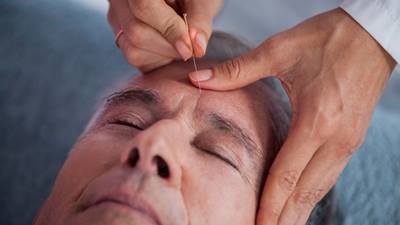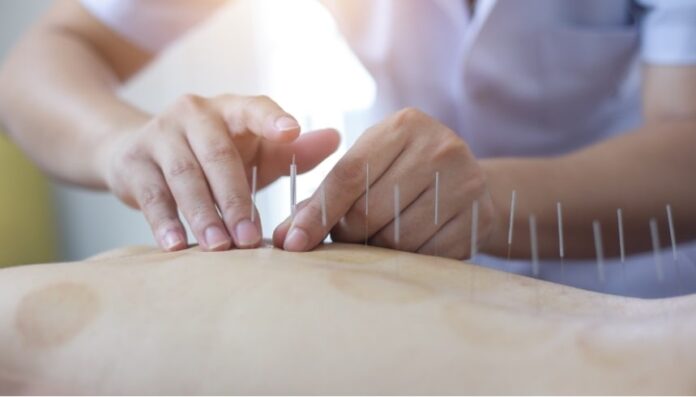Did you know that 14 million Americans have tried acupuncture as a treatment technique?
Acupuncture traces its roots back more than 2,000 years ago to China but, in the last 40 years, it has found increased popularity in the United States to treat a variety of ailments. Although you may be familiar with the term ‘acupuncture,’ you may still have questions about what it is, and if it is an option for your health needs.
What Is Acupuncture?
Acupuncture involves stimulating points on the body by inserting thin needles that are manipulated by hand or sometimes by electrical stimulation. By stimulating specific anatomic sites, also called acupuncture points, acupuncture can promote self-healing.
In traditional Chinese medicine, diseases are caused by the disruption of energy in the body, and acupuncture is meant to help release that flow. Western medicine offers another explanation: the needles stimulate the nerves, which sends signals to the brain to release hormones to minimize pain.
Initially, acupuncture was incorporated into Western medicine as a way to reduce pain, such as back and knee pain or headaches. But recent studies suggest that acupuncture can be used to treat a variety of disorders, including stroke, multiple sclerosis, post-traumatic stress disorder and nausea.
Does Acupuncture Hurt?
The idea of needles being stuck into the skin is daunting, but acupuncture needles aren’t anything like needles that are used for immunizations or for drawing blood. Acupuncturists describe the needles as hair-thin, stainless steel and disposable. While you may feel some sensation as the needles are inserted, it’s not described as painful. Some sensations you may feel have been described as:
- Heavy—as if a weight is being placed on the area, but is perceived as calming, not oppressive.
- Achy—an initial achiness at the site of the needle, which typically dissipates in seconds.
- Electric—a quickly disappearing jolt related to the location of an acupuncture pressure point and the nerve that lies underneath it.
- Tingly—acupuncture points can cause tingling at the site and through the body.
- Warm—a pleasant feeling that spreads around the acupuncture point.
The bottom line is that while acupuncture can cause some unusual sensations, it shouldn’t hurt. If it does, let your acupuncturist know right away so the needles can be adjusted.
Does Acupuncture Work?
Is it worth getting stuck with needles to feel better? According to the National Institutes of Health (NIH), numerous studies suggest acupuncture can help manage pain. While much research is being done on the effects of acupuncture on other conditions, there does not seem to be a conclusive answer. However, acupuncture is proven to be effective in pain management, as well as in managing symptoms of cancer such as nausea, vomiting, diarrhea, constipation, hot flashes, fatigue and mood.
According to the UC San Diego Center for Integrative Medicine, clinical studies have shown acupuncture to be effective for ailments including allergies, depression, hypertension, tennis elbow, morning sickness, malposition of the fetus and stroke. The NIH agrees that scientific research increasingly supports the use of acupuncture for treatment of conditions in addition to pain management, noting that the practice is often covered by insurance policies.

What Is Acupuncture Best For?
Acupuncture is best known to help ease pain, but the American Academy of Medical Acupuncture lists conditions the World Health Organization recommends for acupuncture, including:
- Respiratory diseases, i.e. allergies, colds, tonsillitis
- Bronchitis and asthma
- Eye disorders, such as myopia, acute conjunctivitis
- Orthopedic disorders, i.e. sciatica, rheumatoid arthritis and tennis elbow
- Gastrointestinal disorders, such as hiccups, constipation, diarrhea, gastritis and colitis
- Neurologic disorders, including migraine, facial paralysis and neurogenic bladder infection
What Risks Are Associated with Acupuncture?
When acupuncture is done correctly by a licensed practitioner, the risks are low. Acupuncture should be done in a clean environment, using clean, disposable and unbreakable needles.
According to the NIH, few complications from acupuncture have been reported but, when they are, they usually come from non-licensed acupuncturists using non-sterile needles and delivering treatments improperly. The NIH says these rare but serious adverse effects include infections, punctured organs, collapsed lungs and damage to the central nervous system.
Can I Use Acupuncture in Addition to Other Methods for Reducing Pain?
It’s important to get a clear diagnosis from your physician before considering acupuncture to make sure this is the right step for you. Ask your physician if he/she supports using acupuncture as part of an integrative treatment plan.
(Originally published by Orlando Health; reprinted with permission.)
Looking for similar content? You may also be interested in reading “How Color Therapy Benefits People with Disabilities.”






